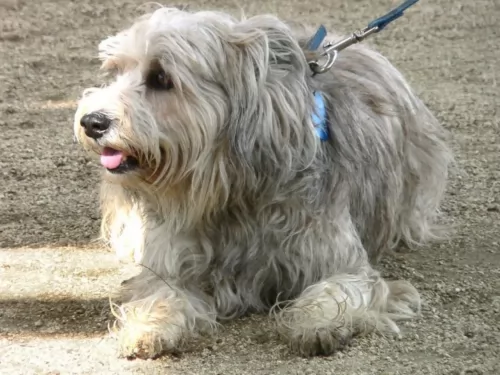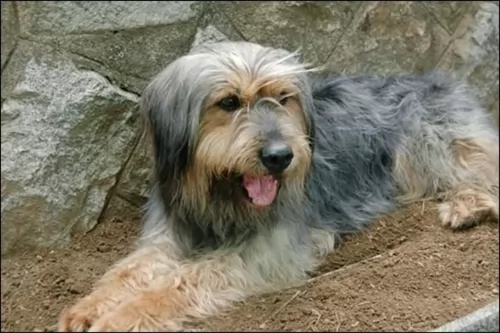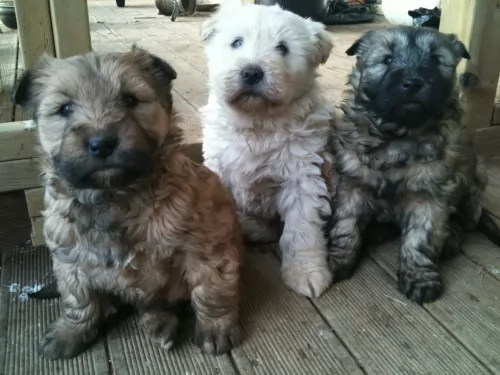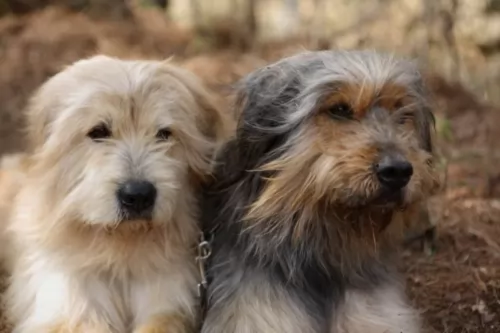 Petzlover
Petzlover Estonian Hound is originated from Estonia but Sapsali is originated from North Korea. Estonian Hound may grow 8 cm / 3 inches shorter than Sapsali. Estonian Hound may weigh 7 kg / 15 pounds lesser than Sapsali. Estonian Hound may live 3 years more than Sapsali. Both Estonian Hound and Sapsali has almost same litter size. Both Estonian Hound and Sapsali requires Moderate Maintenance.
Estonian Hound is originated from Estonia but Sapsali is originated from North Korea. Estonian Hound may grow 8 cm / 3 inches shorter than Sapsali. Estonian Hound may weigh 7 kg / 15 pounds lesser than Sapsali. Estonian Hound may live 3 years more than Sapsali. Both Estonian Hound and Sapsali has almost same litter size. Both Estonian Hound and Sapsali requires Moderate Maintenance.
 In 1947, the Estonian Hound was developed and remains today the only pure breed ever developed in Estonia. At that time the national economic minister of the Soviet Union declared that every country in the USSR must have a national dog breed. Thus, the Estonian Hound and the Estonian Kennel Union were born. The Kennel Union is currently seeking breed recognition from the Federation Cynoloqique Internationale.
In 1947, the Estonian Hound was developed and remains today the only pure breed ever developed in Estonia. At that time the national economic minister of the Soviet Union declared that every country in the USSR must have a national dog breed. Thus, the Estonian Hound and the Estonian Kennel Union were born. The Kennel Union is currently seeking breed recognition from the Federation Cynoloqique Internationale.
The Estonian Hound came from breeding local Estonian hunting dogs with several different breeds of foreign dogs. The Soviet decree also established that hunting dogs had to be no more than 17 inches high. This result in a hunting dog with great agility and drive that is extremely popular in now inependent Estonia. It is the national dog.
 Early documentation of this dog tells us that it has been around for centuries and is therefore an ancient breed.
Early documentation of this dog tells us that it has been around for centuries and is therefore an ancient breed.
The Sapsali is a dog that comes from Korea and is also known as the Lion Dog, Sapsaree and Sapsal Gae. It is believed that these dogs were used to dispel evil spirits or ghosts.
The dog was given the status as National Treasure by the Korean Government in 1992 and is recognized by a number of local Korean dog societies. The dog isn’t however recognized by any of the major kennel clubs, but is affiliated with the Federation Cynologique Internationale (FCI).
When Korea was under Japanese rule, the dogs were slaughtered to make coats for its military and almost became extinct. Kennels were set up and the dog was revived again in the 1980s.
 The Estonian Hound is a strong, muscular body of medium size, with well-developed muscles and strong bones. It has a straight muzzle and skull with defined eyebrows and long drop ears. They have black noses and dark eyes. Their back is wide and straight, and their chest is deep and wide. They have skin that is tight with no wrinkles or folds anywhere.
The Estonian Hound is a strong, muscular body of medium size, with well-developed muscles and strong bones. It has a straight muzzle and skull with defined eyebrows and long drop ears. They have black noses and dark eyes. Their back is wide and straight, and their chest is deep and wide. They have skin that is tight with no wrinkles or folds anywhere.
The Estonian Hound is double coated, but the undercoat is not well developed. The top coat is rough, short and shiny. The tail has a thick covering of hair. The color is usually white with red patches, black or brown patches or yellow patches.
 The Sapsali is a medium sized sheepdog standing at between 48 and 60cm in height and weighing between 16 and 27kg. He is a strong looking dog with the coat being long and dense and coming in quite a few color varieties. The coat can be solid in color but it can also be a mixture of blonde, reddish, brown and black. The hair of the dog also falls over the eyes.
The Sapsali is a medium sized sheepdog standing at between 48 and 60cm in height and weighing between 16 and 27kg. He is a strong looking dog with the coat being long and dense and coming in quite a few color varieties. The coat can be solid in color but it can also be a mixture of blonde, reddish, brown and black. The hair of the dog also falls over the eyes.
The dog has large eyes, the ears are also fairly large and the tail is long and held straight or down.
The dog is friendly, social and playful and also loving and loyal towards his human family. He is protective too and makes a good watchdog, but is never aggressive.
He gets on well with children as well as with other dogs. Training and socialization ensure obedience and good behavior and with a desire to please.
They’re intelligent dogs and training is easy. They’re gentle dogs too and this has made them a popular choice for therapy dogs. Their loving natures have been welcomed by patients suffering with trauma and the dog connects strongly with these people.
When back home he wants to be included in all the family activities. He is quite energetic and will require exercise every day – walks, hikes, frisbee, ball and rope games as well as more hectic hikes. He makes a good choice for the first time dog owner but is better suited to life in the suburbs or the countryside as opposed to being on a small property in the city.
 The Estonian Hound is a happy dog and loves to play with children. He was bred to hunt though and he can get fixated on a scent and knock over a small child.
The Estonian Hound is a happy dog and loves to play with children. He was bred to hunt though and he can get fixated on a scent and knock over a small child.
He is a hunting dog with great agility and drive.
He has had to be adaptable through his short history and is now more a companion than a hunting dog. He can live in the city or country.
He is intelligent and trainable. He is lively and energetic and the challenge might be keeping his attention long enough to train.
 The beautiful Sapsali is a friendly, loving dog breed who is just a little bit wary around strangers.
The beautiful Sapsali is a friendly, loving dog breed who is just a little bit wary around strangers.
If he senses his master is alright around strangers, he will accept them too.
He is both protector and guard dog and gets on well with all members of the household. Apart from the long coat which can be a bit of a handful, this dog ticks all the right boxes in terms of being a most splendid family pet.
 With such a young breed there have not been any studies done on their health or genetic issues. It seems the breed is fairly healthy but there is too little information to really say. Being confined to Estonia there has been little commercial or backyard breeding. He is less likely than most pure breeds to have genetic issues.
With such a young breed there have not been any studies done on their health or genetic issues. It seems the breed is fairly healthy but there is too little information to really say. Being confined to Estonia there has been little commercial or backyard breeding. He is less likely than most pure breeds to have genetic issues.
It is likely that dogs of his type are at risk for:
Caused by excessive exercise before or after having eaten a large meal. It is suggested that you feed your English Setter twice a day, smaller meals and not right before or after strenuous exercise.
 The Sapsali can live to be between 10 and 12 years of age, being a healthy breed. Like all purebreds, the dog will experience some health concerns, among which are heart disease, obesity, bloat, hip dysplasia and skin problems among others.
The Sapsali can live to be between 10 and 12 years of age, being a healthy breed. Like all purebreds, the dog will experience some health concerns, among which are heart disease, obesity, bloat, hip dysplasia and skin problems among others.
Dogs get heart disease just like human beings. The most common form of heart disease in dogs is valvular disease. Essentially it affects small breed dogs. Heartworm disease and dilated cardiomyopathy are also common forms of heart disease.
Sometimes there are symptoms and sometimes there aren’t, but as heart disease progresses it turns to congestive heart failure – the heart not being able to meet the body’s demands. Signs of this can be fatigue, difficulty with breathing, loss of appetite and weight loss, coughing and a distended abdomen.
If you see these signs, your pet will need to get to the vet. There is no cure for congestive heart failure but there are medications which can help the heart work better.
 Feed a high quality dry food made for puppies. Feed ¼ to ½ cup per day in 2-3 meals for the first six months.
Feed a high quality dry food made for puppies. Feed ¼ to ½ cup per day in 2-3 meals for the first six months.
Feed 1 to 2 cups in two meals from 6 months to a year or so.
Feed about 2 to 3 cups in two meals.
As previously mentioned this seems to be a fairly healthy breed.
Be careful not to feed a large meal before or after exercise due to possibility of bloat.
Check their ears and clean them periodically.
The Estonian Hound is a hunting dog and needs a good deal of exercise – at least an hour and a half every day or a long walk if not used for hunting. He is a working dog with a lot of energy and stamina. Don’t let him off leash though or he will follow his nose and take off. He is usually calm and quiet indoors if he gets enough physical and mental stimulation outdoors. He can be destructive and loud, nervous and hyper if he doesn’t. They enjoy Frisbee, agility, tracking and of course hunting.
 The Sapsali is covered in thick, long hair and the coat is going to require a lot of attention. It will be better to give the coat a brush every day as the coat can become very matted and tangled. The dog is also a heavy shedder so a regular brush will help to get rid of all that loose hair.
The Sapsali is covered in thick, long hair and the coat is going to require a lot of attention. It will be better to give the coat a brush every day as the coat can become very matted and tangled. The dog is also a heavy shedder so a regular brush will help to get rid of all that loose hair.
The Sapsali will need to have his ears, eyes and teeth regularly checked to ensure they are clear of any infection and to prevent any illnesses. A bad tooth can create many health issues throughout the dog’s body.
You can enhance your dog’s health by giving him good food. Commercially manufactured dog foods can be a good, convenient choice, more so if you choose the high quality ones known for their natural, quality ingredients.
To provide your dog with just a bit of variety in his diet, some home-made food added into the dry kibble from time to time will delight your pet. No need to make preparing the food a huge issue either. Boil brown rice and chicken in a pot and add in sweet potatoes, carrots and spinach.
Chop all this up and as a treat, add smaller portions of it into the dry kibble when you want to treat your dog. To avoid skin infections, try to include some raw meat into his diet occasionally. Never leave your pet without a constant source of fresh, cool water